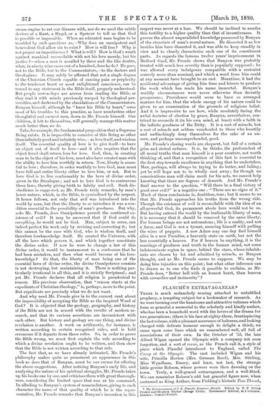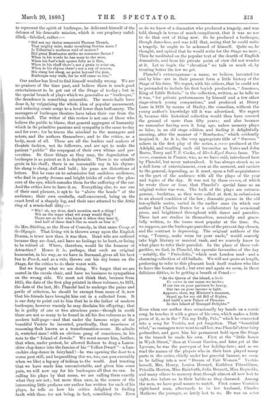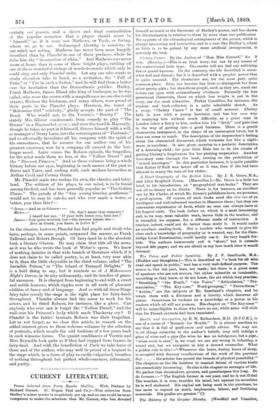PLANCHE'S EXTRAVAGANZAS.* THERE is much melancholy musing attached to unfulfilled
prophecy, a tempting subject for a bookmaker of research. As we were turning over the handsome and attractive volumes which form so graceful a memorial to the scholarly and kindly author, who has been a household word with the lovers of the drama for two generations; (there is his face at eighty-three, frontispiecing the lastvolume, with a pleasant assurance of haleness, and looking charged with delicate humour enough to delight a third), we came upon some lines which we remembered well, all full of associations of their own. In the October of '53, the late Alfred Wigan opened the Olympic with a company not soon forgotten, and a sort of revue, as the French call it, a style of piece which Planche introduced to England, called The Camp at the Olympic. The cast included Wigan and his wife, Priscilla Horton (Mrs. German Reed), Mrs. Stirling, Miss Wyndham, Emery, and least, not last, the strange little genius Robson, whose powers were then dawning on the town. Truly, a well-graced extravaganza, and a well-fitted. We can remember Robson's odd but graceful figure now, when costumed as King Arthur, from Fielding's historic Tom Thumb,
* The Extravaganzas of J. R. Planclar, Somerset Herald. Edited by T. F. Dillon Croker and Stephen Tucker (Rouge Croix). Testimonial Edition, in 5 volumes. London Samuel French.
to represent the spirit of burlesque, he delivered himself of the defence of his dramatic mission, which is our prophecy unful- filled,—falsified, rather :—
" Did not my thrice renowned Thomas Thumb, That mighty mite, make mouthing fustian mum ? Is Tilburina's madness void of matter ? Did great Bombastes strike no nonsense flatter ? When in his words he has none to the wise, When his fool's bolt spares folly as it flies, When in his chaff there's not a grain to seize on, When in his rhyme there's not a ray of reason, His slang but slang, no point beyond the pun, Burlesque may walk, for he will cease to ran."
Our author has lived to find himself woefully wrong. We are no praisers of the time past, and believe there is much good entertainment to be got out of the Stage of to-day ; but in the special branch of plays which we generalise as "burlesque," the decadence is something miserable. The music-halls have done it, by vulgarising the whole idea of popular amusement, and reducing comic songs to a level lower than buffoonery. The managers of burlesque theatres have taken their cue from the music-hall. The writer of this review is not one of those who
believe the public to blame, that general aggregate of humanity ,which in its primitive passions and sympathy is the same to-day
and for ever; for he traces the mischief to the managers and actors, and the authors themselves ; and to the critics, as a body, most of all. These are all the leaders and makers of theatric fashion, not its followers, and are apt to make the patient " public " the scapegoat of their own whims and per- versities. Be these things as they may, the degradation of 'burlesque is as patent as it is deplorable. There is no seizable .grain in his chaff; there is no reasonable ray in his rhyme ; his slang is slang, dull and bald ; his puns are distortions of letters. But he runs on to submissive but smileless audiences, who find in pretty dresses and bright tricks of colour the plea- sure of the eye, which consoles them for the suffering of the ear. And the critics love to have it so. Everything else, to use one of their cant phrases, is apt to be "above the heads" of the audience; their own cerebella, stall-ensconced, being on the -exact level of a shapely leg, and their ears attuned to the Attic ring of a music-hall ditty :—
"Wit! oh, my dear, don't mention such a thing ! Wit on the stage what wit away would ffing ? There are so few who know it when they hear it, And half of those don't like so much as fear it."
So Mrs. Stirling, as the Muse of Comedy, in that same Camp at humourist, in his way, as we have in Burnand, gives all his best fun to Punch, and E .9 a rule, throws out his dry bones on the Stage, for the critics to do their worst with. But we forget what we are doing. We forget that we are seated in the curule chair, and have no business to sympathise on the wrong side. We must not think that, because from 1825, the date of the first play printed in these volumes, to 1871, the date of the last, Mr. Planche had to undergo the pains and perils of criticism, he should be exempt from more of it, now that his friends have brought him out in a collected form. It is our duty to point out to him that he is the father of modern burlesque, however warmly he may disclaim his offspring ; that he is guilty of one or two atrocious puns—though in sooth there are not so many to be found in all his five volumes as in a modern half-page—and that under the famous reign of the beautiful Vestris he invented, practically, that weariness of reasoning flesh known as a transformation-scene. He admits it, wretched man ! with an obvious pang of conscience, in his note to the " Island of Jewels." We must assure him, further, that when, under protest, he allowed Robson to drag a Lanca- shire clog-dance into the fancies of his "Yellow Dwarf "—a Lan- cashire clog-dance in fairyland !—he was opening the door to a worse pest still, and bequeathing (for we, too, can pun execrably when we like) a leg-acy of tedium to the world. And trusting that we have made him uncomfortable, and given him some pain, we will now say for his burlesques all that we can. In calling his plays by that name, we are calling them exactly what they are not ; but more than once, in the course of the interesting little prefaces our author has written for each of his plays, he tells us how his critics delighted in finding fault with them for not being, in fact, something else. Even so do we know of a dramatist who produced a tragedy, and was told, though in terms of much compliment, that it was no use to do that sort of thing now. So he produced a burlesque, though danceless, and was told that, seeing that he could write a tragedy, he ought to be ashamed of himself. Quite so, he thought, and opined that he would write for the Stage no more . Then he meditated on the popular text of the dearth of English dramatists, and from his private point of view did not wonder at it. Let us begin the " elevation " we talk so much of, by treating better the few we get. Planche's extravaganzas—a name, we believe, invented for and by him—are in their present form a little history of the Stage of his time. We regret, with his editors, that lie could not be persuaded to include his first boyish production, "Amoroso, King of Little Britain," in the collection, written, as he tells us it was, "for private performances by himself and a few other stage-struck young companions," and produced at Drury Lane in 1818 by means of Harley, the comedian, without the young author's knowledge till it was advertised. We regret it, because this historical collection would then have covered the ground of more than fifty years ; and also because we remember having seen it long ago, unless memory plays us false, in an old stage edition, and finding it delightfully amusing, after the manner of " Bombastes," which evidently inspired it. As it is, the very appropriate title of " Success" ushers in the first play of the series, a revue produced at the Adelphi, and recalling such old favourites as Yates and John Reeve, Terry and T. P. Cooke, of Black-Eyed Susan fame. The revue, common in France, was, as we have said, introduced here by Planche, but never naturalised. It has always struck us as a dull form of entertainment, even at the moment, and caviare to the general, depending, as it must, upon a full acquaintance on the part of the audience with all the plays of the year and topics of the day. It was not by these revues, of which he wrote three or four, that Planche's special fame as an original writer was won. The bulk of the plays are extrava- ganzas,—burlettas, as they were called at first, in submission to an absurd condition of the law ; dramatic poems in the old ten-syllable metre, varied in the earlier ones (in which our author had Charles Dance for a collaborator) by occasional prose, and brightened throughout with dance and parodies. These last are studies in themselves, musically and grace- fully wiitten, to the tunes most popular at the time. So, we suppose, are the burlesque-parodies of the present day chosen, and the contrast is depressing. The original authors of the song, "Tommy, make room for your uncle," would scarcely take high literary or musical rank, and we scarcely know to what place to refer their parodist. In the place of these vul- garities, we find, in Planche, the operatic favourites of the day --notably, the " Freischfitz," which sent London mad—and a charming collection of old ballads. We will not quote at length, preferring to refer to this pleasant book itself readers who like to leave the beaten track ; but ever and again we seem, in these delicious ditties, to be getting a breath of Praed:— "As the Queen of the island, a ler& En Inane in our cause we invite; If our tax on your patience be heavy, Our tax on your income is light. Approve, then, my Minister's measure, Stand up for my old Bill of Rights, And build a new Palace of Pleasure In this Island of Tranquil Delights." Even when our author does occasionally lay hands on a comic song he touches it with a grace of his own, which makes a little poem of it, as in the " Nix my Dolly, Pals," which he converted into a song for Vestris, not yet forgotten. That "beautiful rebel," as managers were wont to call her, was Planche's true fairy godmother, and gave him his permanent hold upon the Stage in the branch he made his own. First at the "little house in Wych Street," then at Covent Garden, and later yet at the Lyceum, he was the purveyor of her holiday-fare ; and as we read the names of the players who in their turn played many parts in the series, chiefly under her graceful banner, we seem to be falling into a new "Dream of Fair Women." Vestris herself, Mrs. Honey, Louisa Howard, Kathleen Fitzwilliam, Priscilla Horton, Miss Rainforth, Julia Bennett, Miss Reynolds, and many others to memory dear, though almost all now lost to sight, rise before us in their habits as they charmed. Among the men, we have good names to match. First comes Vestris' right-hand man, afterwards to be her husband, Charles Mathews the younger, so lately lost to us. He was an actor entirely aid generis, and a direct and final contradiction of the popular nonsense that a player should never be " himself," as if it were not Mathews, or Toole, or Irving, whom we go to see. Submerged identity is mimicry, to our mind, not acting. Mathews has never been more happily described than by Planelid in one of these prefaces, where he dubs him the "incarnation of whim." And Mathews was never more at home than in some of these bright plays, rattling off one of those wonderful strings of words-to-music which only he could sing, and only Planchd write. Let any one who wants to study elocution take in hand, as a recitation, the "Fall of Paris," or "I'm in such a flutter," and he will find them a better cure for hesitation than the Demosthenic pebbles. Harley, Frank Mathews, James Bland (the king of burlesque, as he was called, who wore the crown with a magnificence no one else could attain), Hudson the Irishman, and many others, were proud of their parts in the Planch6 plays. Harrison, the tenor of "Bohemian Girl" celebrity," gladly accepts the part of "The Beast. Who would not, to the Vestris's "Beauty ?" The stately Mrs. Glover condescends from comedy to play "The Drama" in a Haymarket revue; and even the terrible Macready, though he takes no part in it himself, throws himself with a will, as manager of Drury Lane, into the extravaganza of " Fortunio," and so effectually inoculates all his company with the spirit of his earnestness, that he secures for our author one of his greatest successes, won by a company all unused to the bur- lesque mood. Later comes the Robson episode, the tragedies, for the actor made them no less, of the "Yellow Dwarf" and the "Discreet Princess." And so these volumes bring a whole history before our eyes, beginning in such names of the past as Reeve and Yates, and ending with such modern favourites as Arthur Cecil and Corney Grain. Mr. Planche made two realms his own, the classics, and fairy- land. The wittiest of his plays, to our mind, is to be found among the first, and has been generally popular as "The Golden Fleece." The parody of the "fine young Grecian gentleman" would not be easy to out-do, and who ever made a worse, or better, pun than thin?- "Jason.—And as to Glance— Medea.— Oh, don't name that creature! I heard her say, 'If your wife bores you, beat her !' Jason.—Yon quite mistook her—the reverse meant she— Beta in Greek, you know, is Letter B." In the classics, however, Planchd has had pupils and rivals who have, perhaps, in some points, surpassed the master, as Frank Talfourd and Robert Brough. Of fairy-land he is the absolute lord, a literary Oberon. He may claim that title all the more, as it was he who wrote the book of Weber's opera. We know of nothing daintier in that wide branch of literature which, if it does not claim to be called poetry, is, at least, very near akin to it, than the little chrysolite in the third volume, called "The Invisible Prince," or "The Island of Tranquil Delights." It is a bold thing to say, but it reminds us of A Midsummer Night's Dream, in its airy unhumanity, and its touches of grace- ful unreason. It is charged from beginning to end with a sweet and subtle humour, which ripples over in all sorts of pleasant oddities of fancy and of language. And so with all these Stage fairy-tales (surely the stage is the right place for fairy-land) throughout. Planche always had the sense to work for his actors, and he fitted Robson, for instance, like a glove. Can anybody who ever saw it forget the "Yellow Dwarf," and the wail over his Princess's body which made Thackeray cry ? If Planchd is the fairies' laureate, Robson was their tragedian. Let us not forget, as we close this article, to remark on the added interest given to these welcome volumes by the selection of portraits, which recalls the odd fashions of a few years back in such winsome forms. The quaint semblances of Vestris and Miss Reynolds look quite as if they had stepped from frames in fairy-land. And with the benediction of Puck we take leave of them and of the author, who may well be proud of a bequest to the stage which, in a form of play so easily vulgarised, breathes of nothing throughout but perfect wholesomeness, refinement, and purity.




































 Previous page
Previous page